UN agencies warn Israel's Gaza aid plan risks increasing civilian suffering
'There is no guarantee of safety at the distribution locations or when people are moving,' says UNICEF

- OCHA warns plan fails to meet basic humanitarian standards
GENEVA
UN officials on Friday sharply criticized Israel's recently proposed humanitarian aid plan for Gaza, warning that it could exacerbate civilian suffering and fail to meet basic humanitarian standards.
Speaking at a press briefing in Geneva, UNICEF spokesperson James Elder said the plan's design "will increase the ongoing suffering of children and families in the Gaza Strip."
Elder warned that asking civilians to travel into militarized zones to receive aid "further entrenches force displacement for political and military purposes" and poses severe risks, especially for "the most vulnerable people, the elderly, children with disabilities, sick and wounded, who cannot travel to these designated zones."
"There is no guarantee of safety at the distribution locations or when people are moving," he said, adding that families could be "targeted or caught in the crossfire."
He also expressed alarm over plans to use facial recognition as a prerequisite for aid, calling it "against all humanitarian principles to screen and monitor beneficiaries for intelligence and military purposes."
According to Elder, the proposed aid plan includes only 60 trucks entering Gaza per day -- "this is one tenth of what was being delivered during the ceasefire"-- which he said is "not nearly enough to meet the needs of 1.1 million children, 2.1 million people."
"Civilians must not be forced to flee again," the spokesperson said. "The use of humanitarian aid as a bait to force displacement, especially from the north to the south, will create this impossible choice between displacement and death."
Jens Laerke, spokesperson for the UN Office for the Coordination of Humanitarian Affairs (OCHA), echoed UNICEF's concerns, saying ongoing negotiations with Israeli officials have failed to resolve key issues.
"We’ve had multiple meetings in recent weeks, continuous contacts with Israeli officials to reconcile their concerns with ours," Laerke said. "Those concerns that we have raised have not been met, have not been addressed."
He said that the "applied modality as presented to us does not meet the minimum bar for principal humanitarian support," and warned that under the current plan, the UN would be unable to resume life-saving operations on the required scale.
"The current shape that we have been briefed about by them would not allow us to resume life-saving activities at the scale that was possible prior to the total blockade of Gaza," he said.
Last week, the Israeli plan was presented orally to UN agencies and major aid organizations.
Since March 2, Israel has kept Gaza’s crossings closed to food, medical, and humanitarian aid, deepening an already humanitarian crisis in the enclave, according to government, human rights, and international reports.
Nearly 52,800 Palestinians have been killed in Gaza in a brutal Israeli onslaught since October 2023, most of them women and children.








